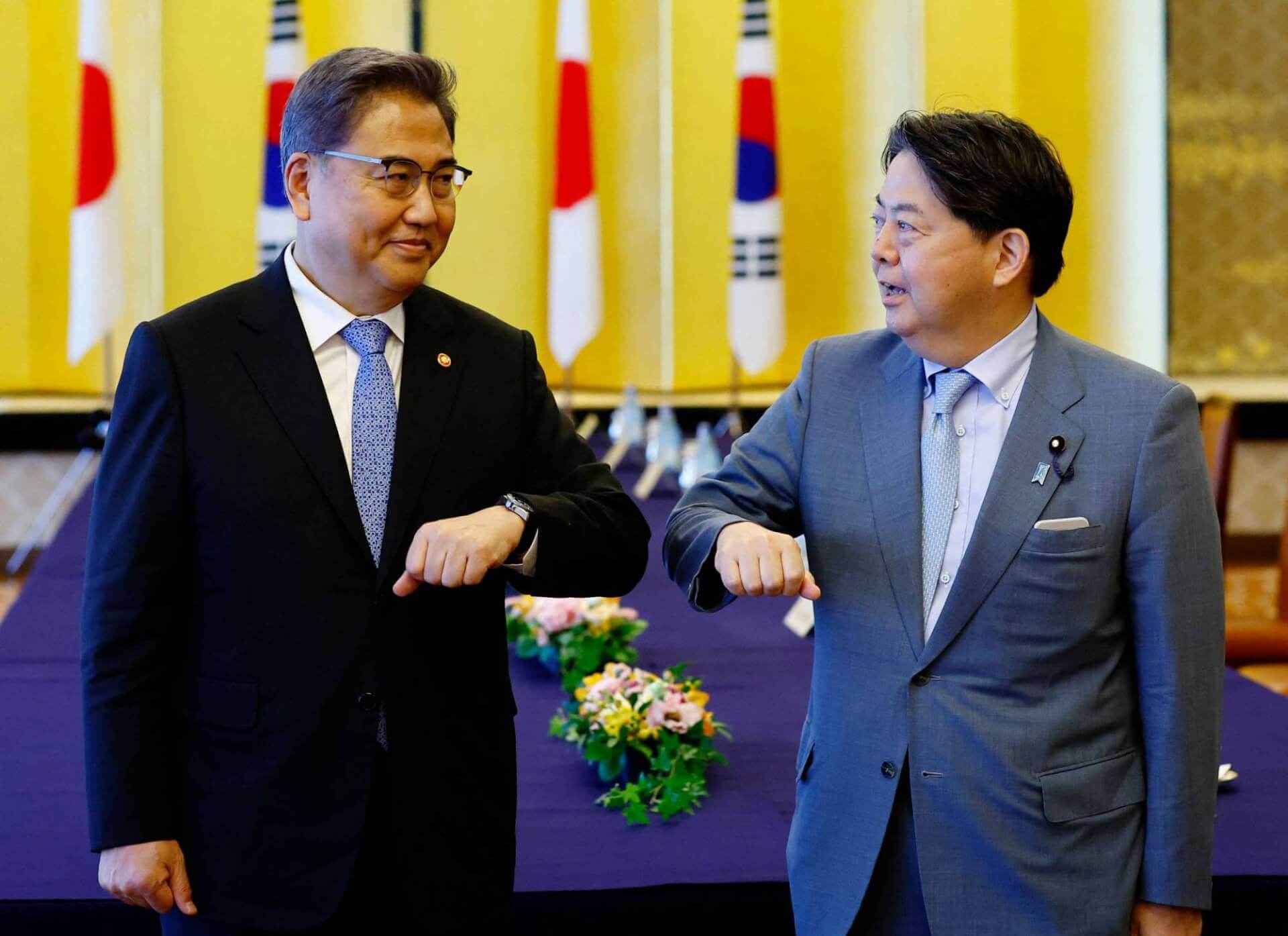The foreign ministers (FMs) of Japan and South Korea, Yoshimasa Hayashi and Park Jin, agreed to jointly counter the growing regional threat posed by North Korea and work towards the complete denuclearisation of the Korean Peninsula.
According to a press release by Japan’s Ministry of Foreign Affairs issued after their phone call, the pair condemned the series of ballistic missile launches by North Korea on 2 and 3 November. They “strongly condemned” North Korea’s “provocations,” which they said have now reached an “unprecedented frequency.” The FMs thus underscored that Pyongyang poses “a grave and imminent threat to the regional security” as well as “a clear and serious challenge to the international community.”
1. Continue to dedicate maximum effort to gather & analyze info & provide the public speedy & adequate info.
— PM's Office of Japan (@JPN_PMO) November 3, 2022
2. Ensure the safety of aircraft, vessels & other assets.
3. Based on the current situation, take all possible measures for precaution, incl. readiness for contingencies.
In this regard, they reaffirmed to continue working closely together with the United States (US) toward the North’s complete denuclearisation in accordance with relevant United Nations Security Council resolutions, “including on enhancement of regional deterrence including security cooperation” among Japan, the US and South Korea.
Hayashi also expressed his condolences for the 151 people who lost their lives during the “tragic” Itaewon crowd crush in Seoul this past weekend. Park thanked Hayashi and also offered his condolences for the loss of life of two Japanese nationals in the tragedy.
Cooperation between the two countries on the issue of North Korea comes despite their divergence on other issues. In August, Japan protested South Korea’s demands that it halt an ongoing survey in Japan’s own exclusive economic zone (EEZ) near its western prefecture of Nagasaki. The site that raised the dispute is located about 110 kilometres northwest of the Japanese island of Mishima. According to Japanese officials, the South Korean coast guard had claimed that the area in question is part of its waters and therefore the survey was illegal. It thus asked the Japanese ship to leave immediately.
.@SecDef: We are committed to building on these efforts to strengthen integrated deterrence… and to ensure that this Alliance continues to bolster security and stability on the Korean Peninsula and throughout the Indo-Pacific. pic.twitter.com/nrBvhmNwNq
— Department of Defense 🇺🇸 (@DeptofDefense) November 3, 2022
The relationship between the two has also been challenged by several other diplomatic tiffs. Last year, South Korea’s Defence Ministry published a white paper that downgraded Japan’s status from “partner” to “neighbour,” which Seoul said was because Tokyo had removed South Korea from its list of preferential export nations in 2019. The document also blamed Japan for “stalemating ties” with South Korea by making “unilateral announcements that misrepresented facts,” referring to Japan’s disputed claim to the Dokdo Islands and a military encounter between a Japanese surveillance plane and a South Korean vessel in December 2018, when Japan accused South Korea of violating the Code for Unplanned Encounters at Sea by aiming the vessel’s fire-control radar at a plane.
Furthermore, in 2018, South Korea’s Supreme Court ordered Japanese companies Mitsubishi and Nippon to “compensate South Koreans forced to work in its factories” during Japanese colonial rule. Following this, last August, a South Korean court began proceedings to liquidate assets seized from Japan’s Nippon Steel Corp, which had refused to comply with a Supreme Court decision to award $8,400 each to four former World War II workers. In fact, South Korean victims of wartime labour conscription sued Japanese companies in the 1990s. However, Japanese courts ruled in favour of the companies, leading the victims to take their cases to South Korean courts instead.
We strongly condemn North Korea’s test of an Intercontinental ballistic missile, which undermines the global nonproliferation regime and violates multiple UN Security Council resolutions. We call on North Korea to immediately cease its destabilizing actions.
— Ambassador Linda Thomas-Greenfield (@USAmbUN) November 3, 2022
Prior to this, in 2015, the two countries sought to settle the dispute over sexual slavery, announcing a “final and irreversible” agreement. As part of the deal, then-PM Shinzo Abe issued an apology and released $8 million for a compensation fund. However, many South Koreans did not accept the agreement and the victims even refused the money in protest. Former South Korean President Moon Jae-in shut down the fund in 2018, reigniting tensions once more.
Hayashi and Park sought to iron out several of these differences during their meeting in July, during which they stressed on the importance of developing “future-oriented” Relations. Hayashi said at that time that bilateral cooperation, as well as their trilateral cooperation with the US, is “ever more important” in the face of North Korea’s expanding nuclear program.
Spoke with ROK First VFM Cho about the DPRK’s recent escalatory missile launches, including one that landed near the ROK’s coast. Our commitment to the security of the ROK and Japan remains ironclad, and we'll partner to address DPRK provocations and other shared challenges.
— Wendy R. Sherman (@DeputySecState) November 3, 2022
On Wednesday, North Korea fired at least 17 missiles towards South Korea, at least one of which landed near their sea border. It marked the first time that a missile from North Korea landed in close proximity to the South’s territorial waters since the division of the peninsula over 70 years ago. It also fired around 100 artillery shells into the eastern maritime buffer zone established in 2018.
The very next day, it fired an inter-continental ballistic missile as well as two short-range missiles toward South Korea’s eastern waters, forcing Japan to issue an evacuation alert and temporarily halt train service.

